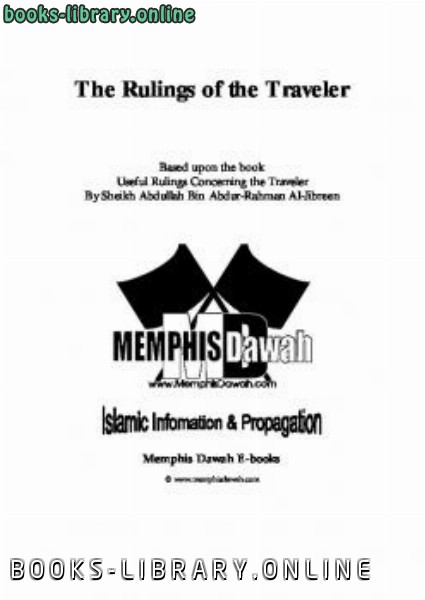📘 قراءة كتاب The Rulings of the Traveler أونلاين


Table of Contents 2
Foreword 3
Introduction 4
Fatawa Concerning the Purification of the Traveler 5
Fatawa Concerning the Prayer of the Traveler 7
Fatawa Concerning the Fast of those who are Traveling 18
General Fatawa Concerning the Traveler 20
Conclusion 25
With traveling being much easier, much more widespread and different nowadays - one
being able to travel half-way around the world within a day or so - Muslims must be familiar
with its rulings.
However if one looks at the condition of those who are traveling nowadays, he would notice
that many of them are unaware of the fundamental rulings of the traveler.
After noticing this and hearing so many questions from several different people about this
issue of traveling, it became apparent that there was a need to gather rulings concerning
traveling into a book.
So for this reason, we selected some issues and questions that are most commonly
confronted by the traveler, and left those that are rare.
All of the questions originate from the book “Useful Rulings Concerning the Traveler” and
are answered by Shaykh Abdullah bin Abdur-Rahman Al-Jibreen
We ask Allah to make this work beneficial to the reader.
Question 1: A man is traveling by car when the time for Thuhr begins. While he is on the
highway he looks for water from amongst his belongings in his car to perform wudu’, but
finds no water. However, he is certain that after a half hour, that he will reach a place where
water is available. Is it permissible for him to make Tayamum and pray or should he delay
his prayer until he reaches an area that has water?
Answer 1: Ali (May Allah be pleased with him) used to order the Muslims to delay the
prayer until they reached water, if they were advancing towards a near place that had water.
He used to prohibit them from praying until the water arrived if he sent someone to retrieve
water. This was done except when they felt the time for prayer would expire before the
water reached them or before they reached the water as Ibn Abi Shayba and others have
said. For this reason the Fuqahaa said that it is better to delay the Tayamum to the latter
part of the time for prayer, if you expect to reach water.
Question 2: We travel by car sometimes and the prayer time begins while we have no water
with us, we stop, make tayamum and pray. Are our actions correct or are we obligated to
bring water with us seeing that there is no hardship?
Answer 2: You are obligated to bring water if you know there will be a need for it and there
is no hardship upon you, just as you would bring water for drinking and other purposes. On
the other hand if you know you will reach water during your journey at a gas station, small
town or you will reach your destination before the time leaves for prayer, then you are not
obligated to bring water with you. It is always preferred to bring water since there is always
the possibility of the unexpected, such as your car breaking down.
Question 3: A man is traveling by car when prayer time begins, so he looks for water for
wudu’ but does not find any, so he makes tayamum and prays. Afterwards he sees a bottle
of water under his car seat that he had no knowledge of. Does he have to repeat his prayer?
Answer 3: As long as he thoroughly searched for water and did not find it, then he does not
have to repeat the prayer since there was no negligence.
Question 4: A man who was traveling by car, while Maghrib prayer began, immediately
performed tayamum, as a result of not having water, even though he knew he could have
reached a gas station in fifteen minutes. He prayed immediately in order to pray as soon as
the time for prayer came in. Was his action correct?
Answer 4: If he was sure he would reach water after a few minutes, yet he made tayamum,
then his prayer is not valid because he prayed with tayamum while having the ability to reach
water. He is allowed to continue traveling and delay the prayer even until time of Ishaa and
pray them both together. This is why we said he should repeat the prayer.
Question 5: A man was traveling by car, pulled over to the side of the road to sleep, and
when he woke up he found he was in the state of Janabah (Needing Ghusl). But the water
that he had was only enough to perform Wudu’. So what should he do?
Answer 5: If the water is a small amount then use it to make wudu’, and then perform
tayamum in place of the Ghusl. As for the situation where the water is enough for him to
perform Ghusl for some parts of the body and not others, then he should make Ghusl for
those body parts and make tayamum in place of the rest. This is due to the general
understanding of the verse:
“So keep your duty to Allah as best you can, and listen, and obey, and spend; that is
better for your souls.” {At-Taghabun: 16}
And the hadith “and if I order you to something then fear Allah concerning it as much as
possible” {Al-Bukhari and others}
Question 6: A man traveling by car while the time for prayer began stops at a gas station
but finds no water, except with a man who is selling water for a high unreasonable price. If
he is able to afford it, does he have to purchase the (high priced) water or can he make
tayamum?
Answer 6: He does not have to buy the water as long as it is expensive; on the other hand if
the water was at regular cost or slightly above, then he would be obligated to purchase it as
long as he could afford it. Otherwise it is sufficient to perform tayamum.
A proof that the Qur’an is from God and that Muhammad is a Messenger of God.
حجم الكتاب عند التحميل : 89.1 كيلوبايت .
نوع الكتاب : pdf.
عداد القراءة:
اذا اعجبك الكتاب فضلاً اضغط على أعجبني و يمكنك تحميله من هنا:

شكرًا لمساهمتكم
شكراً لمساهمتكم معنا في الإرتقاء بمستوى المكتبة ، يمكنكم االتبليغ عن اخطاء او سوء اختيار للكتب وتصنيفها ومحتواها ، أو كتاب يُمنع نشره ، او محمي بحقوق طبع ونشر ، فضلاً قم بالتبليغ عن الكتاب المُخالف:
 قبل تحميل الكتاب ..
قبل تحميل الكتاب ..
يجب ان يتوفر لديكم برنامج تشغيل وقراءة ملفات pdf
يمكن تحميلة من هنا 'http://get.adobe.com/reader/'


 منصّة المكتبة
منصّة المكتبة 